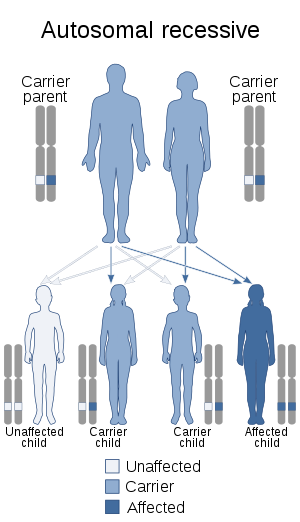Cohen syndrome
Cohen syndrome (also known as Pepper syndrome or Cervenka syndrome) is a very rare autosomal recessive genetic disorder with varied expression, characterised by obesity, intellectual disability, distinct craniofacial abnormalities and potential ocular dysfunction.
| Cohen syndrome | |
|---|---|
| Other names | Pepper syndrome, Cervenka syndrome |
 | |
| This condition is inherited in an autosomal recessive manner. | |
Genetics
This syndrome is believed to be a gene mutation in chromosome 8 at locus 8q22 gene COH1.[1] It has an autosomal recessive transmission with variable expression.[2] There is evidence that this syndrome has a different mutation in the same gene as Mirhosseini–Holmes–Walton syndrome.[3][4]
Diagnosis
Cohen syndrome is diagnosed by clinical examination but is often difficult due to variation in expression. Ocular complications, though rare, are listed as optic atrophy, microphthalmia, pigmentary chorioretinitis, hemeralopia (decreased vision in bright light), myopia, strabismus, nystagmus and iris/retinal coloboma.
General appearance is obesity with thin/elongated arms and legs. Micrognathia, short philtrum and high vaulted palate are common. Variable intellectual disability with occasional seizure and deafness also is characteristic of Cohen syndrome.
Management
Some of the symptoms of Cohen syndrome can be addressed through early intervention with medical specialists. Those who have this disease may benefit from early exposure to speech, physical, and occupational therapy to correct symptoms such as joint overflexibility, developmental delays, hypotonia, and motor clumsiness.[5] Diagnosis may potentially be delayed due to the lack of a definitive molecular test as well as the clinical variability of published case reports.[6]
Glasses are beneficial to those who have severe nearsightedness, whereas individuals with retinal degeneration need training for the visually impaired, which is usually more beneficial when this is addressed at a young age. Younger patients start out having unimpaired vision, but it starts to deteriorate at a young age and does so slowly.[7] If vision is able to improve with the use of glasses, it usually improves cognitive skills as well.[8]
The type of therapy needed for each individual varies, as not every affected individual would benefit from speech, physical, and occupational therapies. The type of therapy for each person is highly individualized. Individuals who have Cohen syndrome may also benefit from psychosocial support.[9]
Many people who have Cohen syndrome also suffer from neutropenia which is a condition in which an individual has an abnormally low number of white blood cells called neutrophils. Having this condition may make these individuals susceptible to infections. Granulocyte-colony stimulating factor (G-CSF) is one possible treatment for neutropenia.[9]
Monitoring weight gain and growth is crucial, as well as annual ophthalmologic and hematologic evaluations and checkups.[5] While there are treatments available to people with Cohen syndrome, there are no known cures for the disease.
Prevalence
Over the past several years, there have been approximately 50 new cases worldwide. There are population groups with this condition in Australia, New Zealand, the UK and the US. It still seems to go undiagnosed, leaving the number of known cases less than 500.
Etymology
The syndrome is named after Michael Cohen, William Pepper and Jaroslav Cervenka, who researched the illness.
References
- Kolehmainen J, Black GC, Saarinen A, Chandler K, Clayton-Smith J, Träskelin AL, Perveen R, Kivitie-Kallio S, Norio R, Warburg M, Fryns JP, de la Chapelle A, Lehesjoki AE (June 2003). "Cohen syndrome is caused by mutations in a novel gene, COH1, encoding a transmembrane protein with a presumed role in vesicle-mediated sorting and intracellular protein transport". American Journal of Human Genetics. 72 (6): 1359–69. doi:10.1086/375454. PMC 1180298. PMID 12730828.
- Kivitie-Kallio S, Norio R (August 2001). "Cohen syndrome: essential features, natural history, and heterogeneity". American Journal of Medical Genetics. 102 (2): 125–35. doi:10.1002/1096-8628(20010801)102:2<125::AID-AJMG1439>3.0.CO;2-0. PMID 11477603.
- Norio R, Raitta C (October 1986). "Are the Mirhosseini-Holmes-Walton syndrome and the Cohen syndrome identical?". American Journal of Medical Genetics. 25 (2): 397–8. doi:10.1002/ajmg.1320250227. PMID 3096139.
- Horn D, Krebsová A, Kunze J, Reis A (June 2000). "Homozygosity mapping in a family with microcephaly, mental retardation, and short stature to a Cohen syndrome region on 8q21.3-8q22.1: redefining a clinical entity". American Journal of Medical Genetics. 92 (4): 285–92. doi:10.1002/(sici)1096-8628(20000605)92:4<285::aid-ajmg13>3.0.co;2-d. PMID 10842298.
- "Cohen syndrome". Genetic and Rare Diseases Information Center (GARD) – an NCATS Program. Retrieved 2018-11-09.
- Chandler KE, Kidd A, Al-Gazali L, Kolehmainen J, Lehesjoki AE, Black GC, Clayton-Smith J (April 2003). "Diagnostic criteria, clinical characteristics, and natural history of Cohen syndrome". Journal of Medical Genetics. 40 (4): 233–41. doi:10.1136/jmg.40.4.233. PMC 1735413. PMID 12676892.
- Kivitie-Kallio S, Norio R (August 2001). "Cohen syndrome: essential features, natural history, and heterogeneity". American Journal of Medical Genetics. 102 (2): 125–35. doi:10.1002/1096-8628(20010801)102:2<125::aid-ajmg1439>3.0.co;2-0. PMID 11477603.
- "Cohen Syndrome - NORD (National Organization for Rare Disorders)". NORD (National Organization for Rare Disorders). Retrieved 2018-11-09.
- Wang H, Falk MJ, Wensel C, Traboulsi E (1993). Adam MP, Ardinger HH, Pagon RA, Wallace SE, Bean LJ, Stephens K, Amemiya A (eds.). "Cohen Syndrome". University of Washington, Seattle. PMID 20301655. Retrieved 2018-11-10. Cite journal requires
|journal=(help)
External links
| Classification | |
|---|---|
| External resources |